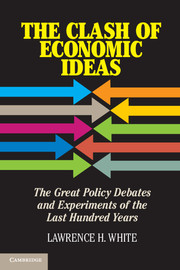Book contents
- Frontmatter
- Contents
- Figures
- Acknowledgments
- Introduction
- 1 The Turn Away from Laissez-Faire
- 2 The Bolshevik Revolution and the Socialist Calculation Debate
- 3 The Roaring Twenties and Austrian Business Cycle Theory
- 4 The New Deal and Institutionalist Economics
- 5 The Great Depression and Keynes’s General Theory
- 6 The Second World War and Hayek’s Road to Serfdom
- 7 Postwar British Socialism and the Fabian Society
- 8 The Mont Pelerin Society and the Rebirth of Smithian Economics
- 9 The Postwar German “Wonder Economy” and Ordoliberalism
- 10 Indian Planning and Development Economics
- 11 Bretton Woods and International Monetary Thought
- 12 The Great Inflation and Monetarism
- 13 The Growth of Government
- 14 Free Trade, Protectionism, and Trade Deficits
- 15 From Pleasant Deficit Spending to Unpleasant Sovereign Debt Crisis
- Index
- References
8 - The Mont Pelerin Society and the Rebirth of Smithian Economics
Published online by Cambridge University Press: 05 June 2012
- Frontmatter
- Contents
- Figures
- Acknowledgments
- Introduction
- 1 The Turn Away from Laissez-Faire
- 2 The Bolshevik Revolution and the Socialist Calculation Debate
- 3 The Roaring Twenties and Austrian Business Cycle Theory
- 4 The New Deal and Institutionalist Economics
- 5 The Great Depression and Keynes’s General Theory
- 6 The Second World War and Hayek’s Road to Serfdom
- 7 Postwar British Socialism and the Fabian Society
- 8 The Mont Pelerin Society and the Rebirth of Smithian Economics
- 9 The Postwar German “Wonder Economy” and Ordoliberalism
- 10 Indian Planning and Development Economics
- 11 Bretton Woods and International Monetary Thought
- 12 The Great Inflation and Monetarism
- 13 The Growth of Government
- 14 Free Trade, Protectionism, and Trade Deficits
- 15 From Pleasant Deficit Spending to Unpleasant Sovereign Debt Crisis
- Index
- References
Summary
In a small Swiss village above the northern shore of Lake Geneva, in April 1947, the German economist Walter Eucken peeled and ate an orange with obvious delight. It was his first orange in many years. His visit to Switzerland, to attend an international meeting of three dozen classical liberal academicians and journalists, was his first trip outside Germany since the end of the Second World War. Despite his strong opposition to the Nazis, Eucken had remained in Germany for the duration of the war, where central control of the economy made oranges unavailable (except perhaps to the ruling elite). The German economy remained centrally controlled by the occupying powers immediately after the war’s 1945 end. Eucken had almost been unable to travel to Switzerland because of the difficulty of securing an administrative authorization to leave the country.
THE POSTWAR CLIMATE OF OPINION
In a November 1992 interview, Milton Friedman recalled the climate of opinion in the 1940s and 1950s: “It was a climate in which those of us who believed in free markets and in a socially and politically free society were a tiny, very much beleaguered minority. Collectivism– economic, social, political– was very much in the ascendancy.”
- Type
- Chapter
- Information
- The Clash of Economic IdeasThe Great Policy Debates and Experiments of the Last Hundred Years, pp. 202 - 230Publisher: Cambridge University PressPrint publication year: 2012



